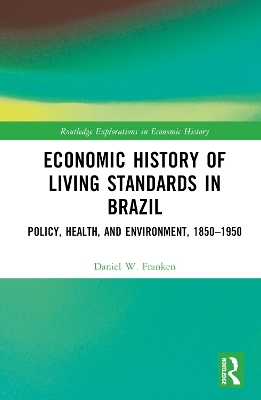
Economic History of Living Standards in Brazil
Routledge (Verlag)
978-1-032-72291-7 (ISBN)
Incorporating political, economic, and environmental factors, this book explores the evolution of health and living standards in Brazil in the nineteenth and twentieth centuries. It draws on anthropometric data and an interdisciplinary approach to illuminate the profound socioeconomic transformations that unfolded in Brazil during this period.
Through an analysis of archival military and passport records, the book reveals an increase in heights starting in the 1880s, predating the Vargas Era’s economic growth and social reforms. It also offers novel insights into Brazil’s regional development divide, showing that regional height differentials existed as early as the mid-nineteenth century (before industrialization began in earnest). Innovative methods, such as surname sorting to study immigration and merging anthropometric data with historical weather records to study the link between climate and health, are introduced. Qualitative evidence on municipal-level clean water and sewage interventions, along with data on malaria and hookworm disease, further corroborate the observed longitudinal trends and spatial patterns in stature.
Scholars and students of historical anthropometrics, living standards, and Brazilian history will find this book essential, as will those with a broader interest in Latin American or economic history.
Daniel W. Franken is Assistant Professor of Economic and Social History at the University of Groningen, the Netherlands, where he teaches classes on globalization, quantitative methods, business history, and modern Latin America. His research interests lie at the intersection between quantitative history and public health, with a special focus on tropical disease and policy. Upcoming research projects include an examination of the impact of sanitation on infant mortality in São Paulo between 1870 and 1940 and a study on hookworm in Brazil in the early twentieth century.
Introduction Part I. Research Gap and Methods of Study 1. What do we Know about Health and Living Standards in Modern Brazil? 2. Measuring Health and Living Standards: Heights and their Determinants Part II. Anthropometric Data Series and Longitudinal Trends 3. The Sources 4. Temporal Height Trends of the AHEX and AN Series Part III. Potential Explanations of Trends and Patterns 5. Analysis and Discussion of Longitudinal Trends 6. The Environment, Policy, and Health Conclusion Appendix A Appendix B Appendix C Appendix D Bibliography Index
| Erscheinungsdatum | 18.10.2024 |
|---|---|
| Reihe/Serie | Routledge Explorations in Economic History |
| Zusatzinfo | 52 Tables, black and white; 1 Line drawings, black and white; 30 Halftones, black and white; 31 Illustrations, black and white |
| Verlagsort | London |
| Sprache | englisch |
| Maße | 156 x 234 mm |
| Gewicht | 553 g |
| Themenwelt | Geschichte ► Teilgebiete der Geschichte ► Kulturgeschichte |
| Geschichte ► Teilgebiete der Geschichte ► Wirtschaftsgeschichte | |
| Wirtschaft ► Volkswirtschaftslehre ► Makroökonomie | |
| Wirtschaft ► Volkswirtschaftslehre ► Mikroökonomie | |
| ISBN-10 | 1-032-72291-6 / 1032722916 |
| ISBN-13 | 978-1-032-72291-7 / 9781032722917 |
| Zustand | Neuware |
| Informationen gemäß Produktsicherheitsverordnung (GPSR) | |
| Haben Sie eine Frage zum Produkt? |
aus dem Bereich


